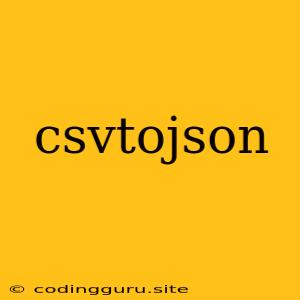The Power of CSVtoJSON: Transforming Data from Tables to JSON
In the realm of data manipulation, converting data between formats is a frequent task. One common scenario involves transforming data from a comma-separated value (CSV) file into a JavaScript Object Notation (JSON) format. This process is crucial for various applications, such as data analysis, web development, and API integration.
Here's where csvtojson comes into play. It's a powerful and versatile Node.js package designed specifically for converting CSV files to JSON, providing a streamlined and efficient solution for this data transformation need.
Why Choose CSVtoJSON?
CSVtoJSON is a popular choice for data conversion due to its ease of use, flexibility, and robust features. It offers several advantages over manual parsing or other methods:
- Simplicity: The package's intuitive API makes it incredibly easy to convert CSV files to JSON with just a few lines of code.
- Efficiency: CSVtoJSON leverages optimized parsing techniques to handle large CSV files efficiently, saving valuable time and resources.
- Customization: You can tailor the conversion process to suit your specific requirements, customizing headers, data types, and more.
- Error Handling: CSVtoJSON includes built-in error handling to prevent unexpected issues during conversion, ensuring data integrity.
A Quick Walkthrough: Converting CSV to JSON
Let's illustrate how CSVtoJSON simplifies the conversion process with a practical example.
-
Installation: Start by installing the csvtojson package using npm:
npm install csvtojson -
Import: Import the csvtojson module in your Node.js script:
const csvtojson = require('csvtojson'); -
Conversion: Use the
csvtojson()function to read your CSV file and convert it to JSON:csvtojson().fromFile('your_data.csv') .then(data => { // Process the JSON data console.log(data); }) .catch(err => { console.error(err); });In this example,
'your_data.csv'represents the path to your CSV file. Thethencallback receives the converted JSON data, while thecatchcallback handles any potential errors during the conversion.
Beyond Basic Conversion: Customizing Your Workflow
CSVtoJSON goes beyond basic conversion, offering a range of options for fine-tuning the process.
1. Specifying Column Headers:
You can explicitly define column headers for your JSON objects. This is particularly useful when dealing with CSV files that lack a header row.
csvtojson({
noheader: true,
headers: ['column1', 'column2', 'column3']
})
.fromFile('your_data.csv')
.then(data => {
// Process the JSON data
console.log(data);
})
.catch(err => {
console.error(err);
});
2. Handling Special Characters:
CSVtoJSON allows you to customize how special characters are handled during conversion. You can specify options like trim to remove leading and trailing whitespace or escape to escape special characters.
csvtojson({
trim: true,
escape: true
})
.fromFile('your_data.csv')
.then(data => {
// Process the JSON data
console.log(data);
})
.catch(err => {
console.error(err);
});
3. Working with Large Files:
For large CSV files, CSVtoJSON provides features to handle them efficiently. You can set the chunkSize option to read the file in smaller chunks, preventing memory issues.
csvtojson({
chunkSize: 1024
})
.fromFile('your_data.csv')
.then(data => {
// Process the JSON data
console.log(data);
})
.catch(err => {
console.error(err);
});
4. Custom Data Types:
CSVtoJSON enables you to specify the data type for each column in your JSON output. This ensures that the converted data aligns with your application's requirements.
csvtojson({
columns: [
{
column: 'column1',
type: 'number'
},
{
column: 'column2',
type: 'string'
}
]
})
.fromFile('your_data.csv')
.then(data => {
// Process the JSON data
console.log(data);
})
.catch(err => {
console.error(err);
});
Beyond CSV: Handling Other Formats
CSVtoJSON is not limited to converting CSV files. It also supports other data formats, such as:
- JSON: You can convert JSON data to CSV using the
json2csvfunction. - Array of Objects: You can directly convert an array of JavaScript objects to CSV using the
json2csvfunction.
Real-world Applications of CSVtoJSON
CSVtoJSON finds widespread applications in various domains, including:
- Web Development: Converting CSV data to JSON for displaying tables, charts, and other data visualizations on web pages.
- Data Analysis: Loading and processing CSV datasets for statistical analysis, machine learning, and data exploration.
- API Integration: Converting CSV data to JSON for use in APIs to exchange data between different applications.
- Database Integration: Importing CSV data into databases by first converting it to JSON, which is a common format for database operations.
Conclusion
CSVtoJSON empowers developers and data analysts with a streamlined and efficient solution for converting CSV data to JSON. Its ease of use, flexibility, and robust features make it an invaluable tool for any project involving data transformation. By leveraging CSVtoJSON, you can effortlessly process, analyze, and utilize data from CSV files, unlocking new possibilities in data-driven applications.
